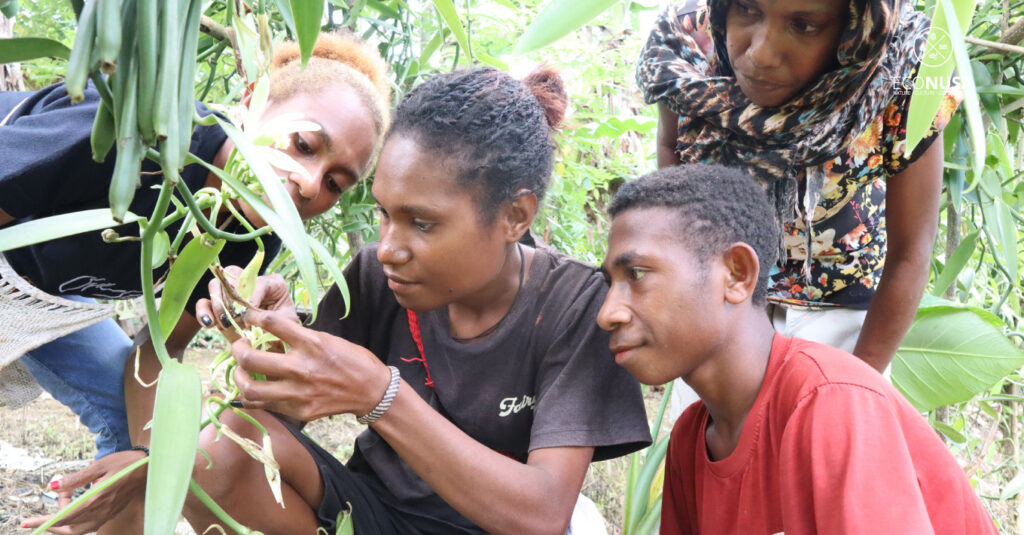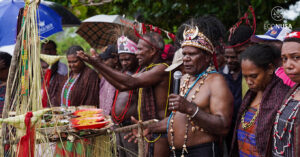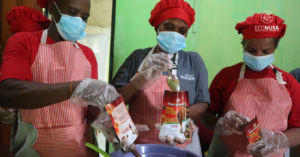
Vanilla (Vanilla planifolia) has a high economic value. No wonder it is known as green gold and has become one of the most popular products on an international scale. With a price of US$200 or equivalent to Rp.2.85 million per 500gr, vanilla beans are ranked as the third most expensive spice in the world.
Local communities in Jayapura, Papua have been trying to cultivate vanilla due to its high price. Thousands of vanilla seeds were distributed to local farmers in the area.
Paul Wouw is one of Vanilla farmers from Kampung Rephang Muaif, Jayapura. The 57-year-old man has planted more than 3,000 vanilla beans since 2010. However, he still faces challenges as vanilla requires special treatment to get maximum results. “The field instructors have come to our village, but they only took pictures of the farm and gave books. No explanations on the cultivation process,” he said.
Read Also: Good News, Gelek Ulim Abgies Pela Customary Territory Receives Government Recognition
From 2010 until early 2023, Paul had only harvested his vanilla three times. They were sold at a lower price than the market. “The maximum production was only 10 kilograms. The harvested vanilla was sold to collectors. The money we got was only enough to buy sugar and tea,” he explained.
The similar problem was experienced by other farmers. The head of the Sarmai Atas Village Vanilla Group, Abiatar Waisimon, said that his group members’ yields were still minimal. “In our group, the highest harvest yield was 27 kilograms, even though there were 1,000 vanilla trees,” he said.
Due to unsatisfactory results, many farmers prefer to abandon their vanilla plants. Some farmers even chose to cut down their plants.
Yustus Yekusamon from Perkumpulan terbatas untuk Pengkajian dan Pemberdayaan Masyarakat Adat Papua (Pt.PPMA) said that the farmers have received very few training or knowledge on vanilla. Thus, local farmers treated vanilla farming similar to other crops. Vanilla plants indeed cannot be treated carelessly to get optimal results. Vanilla plants need a host plant, regular fertilization, and assisted pollination by humans. “If farmers understand the correct cultivation process, vanilla plants will not disappoint these farmers,” he said.
Read Also: Waimon and Kasimle Village Schools: Training for Village Development
The EcoNusa Foundation in collaboration with Pt.PPMA, conducted a training to educate farmers on Vanilla Cultivation through Village Schools on February 19-March 4 2023. The Village Schools this time were held in 4 villages, namely Uskwar Village and Wembi Village in Keerom Regency, as well as Rephang Muaif Village and Upper Sarmai Village in Jayapura Regency. At this Village School, farmers were taught to implement the correct vanilla farming process, starting from preparing the land to harvesting. These farmers also directly practice the steps in their land.
The local communities expressed their enthusiasm about this program. It was shown on high numbers of participants from each village that have exceeded the maximum capacity of 20 participants. Even in Wembi Village, the number of participants increased to 40 people.
Elisabeth Wouw, one of the participants who took part in the Rephang Muaif Village School, said the vanilla cultivation learning process provided by the EcoNusa team and Pt.PPMA was the answer to the problems that have been faced by vanilla farmers so far. “How to cross types of flowers, how to control vines in the right way, make “mulsa”, and calculate the economic profit and loss, we learned them all today. Now we understand,” she said.
Read Also: Paniai Coffee Nominated as Finalist in Jakarta Coffee Week 2022
The village cadre of Uskwar, Serfandus Penaf, who accompanied the community at the village school, was very enthusiastic in joining this activity. He had previously attended the Social Transformation School held by EcoNusa in Kampung Wambes, Keerom in October 2022. “I started to get motivated when I took part in the Social Transformation School activities at Wambes. Now I have planted 100 vanilla plants,” he said.
He and Ondoafi of Uskwar Village, Manfret Isumungkir, promised to spread the knowledge of vanilla cultivation in Uskwar Village. Uskwar village government has also allocated a budget for economic empowerment to strengthen the vanilla plantation.
Similar to Uskwar Village, The Head of Rephang Muaif Village, Albertina Demotokay, has also decided that all of the budget of economic empowerment from the village funds would be devoted entirely to the development of vanilla cultivation. “These sessions and material given were amazing. I am very happy, the residents here are also very happy to get clear information. So I have conveyed to the residents that the economic empowerment funds will be used 100 percent for the development of vanilla cultivation,” she explained.
Wembi Village Secretary, Anita Bogor, also committed to allocate the Wembi village funds to procure seeds. “We, the village government, will allocate 30 percent of the funds for the procurement of vanilla seeds,” he said.
Implementation of Village Schools is a series of Eco-Involvement School activities. The program begins with a process of mapping potential commodities and lists down problems faced by the local communities. From the info gathered, EcoNusa formulated material for the Village Head Workshop and Social Transformation School. These activities were conducted in Wambes Village, Mannem District, Keerom Regency in October 2022. Then, the program was continued with Village School activities.
Editor: Nur Alfiyah & Swiny Adestika







